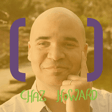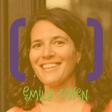Embracing Uncertainty and Curiosity
00:00:00
Speaker
My mission in life is to just get people to respect and get familiar with and comfortable with uncertainty.
00:00:09
Speaker
And not in a like, I can't do anything kind of way that just diminishes you, but in a way that almost like engages your curiosity, engages your skepticism, and sort of keeps you from the sort of things that derive from over certainty. You can't trust what you see. You can't trust what you hear.
00:00:31
Speaker
You have to allow for uncertainty, just scientifically. Like, there's just, it isn't even like a philosophical thing to say, like, you never know what's gonna happen. It's like, no, really, you never know what's, you don't even know what's happening right now.
Introducing David Dylan Thomas
00:00:53
Speaker
It's Uncommon Good, the podcast where we chat to ordinary people doing uncommon good in service of our common humanity. I'm Pauli Reis, fam. I am delighted and humbled to bring you the legendary David Dylan Thomas. He is a filmmaker, author, podcaster, speaker, thought leader.
00:01:17
Speaker
the ultimate multi-hyphenate. David's primary life question, how do you get comfortable with uncertainty?
Sensitive Topics: Bullying and Racial Violence
00:01:27
Speaker
Can you get comfortable with uncertainty? Well, David says you can, and he has a list of credits to back that thinking up.
00:01:36
Speaker
a TED Talk, his book, Design for Cognitive Bias, his first podcast, the Cognitive Bias podcast, his second podcast. Lately, I've been thinking about. A quick content warning off the top. We do talk a decent amount about bullying, race-based violence, depression, and a little bit of slavery. So if these are not things that are right for you to listen to, feel free, switch this one off and we will catch you in the next one.
Live Recording: Design Impact and Epistemology
00:02:06
Speaker
In our first ever live taped episode, we talk about how design impacts our lives, questions on the nature of good and bad, and how we know things, or epistemology, if you're fancy. Plus, David takes questions from the audience live. This was taped before a live audience at Venture Cafe, Philadelphia. I am so grateful to bring you David. Please enjoy.
00:02:35
Speaker
David Dylan Thomas runs a program called Idea Exchange, among other things. He's a filmmaker, has written this lovely little book called Design for Cognitive Bias, has his own podcast, has at least one TED Talk that I've seen, thought leader, author, filmmaker, convener of great minds, some of which who have participated in different components of like his sphere
Design Mitigating Biases
00:03:03
Speaker
of things are here today.
00:03:05
Speaker
How did you get to this multi-hyphenate space person that you are? Very clumsily. I need to go far enough back. I guess a couple threads to pull on, right? How did I arrive at being really interested in cognitive bias? How did I arrive at storytelling and movie making? How did I arrive at being in the digital space? The cognitive bias piece, I would say, comes from my mother was a psych major at UCLA.
00:03:35
Speaker
You know, my wife is a pediatric neuropsychologist, a chop, so I've always been adjacent to people who are fascinated by the brain, and then by osmosis would be like, hey, here's this book by Oliver Sacks. Oh my God, the brain is fascinating. And what really tipped it into full-time obsession was I saw a talk by Iris Bonnet called Gender Equality by Design.
00:03:56
Speaker
And it's on YouTube. You can find that it's fantastic. But she really gets at this notion of there are design choices you can make that actually influence biases that we have. So a simple example might be the way some hotel rooms – you find this a lot in Europe – if you want the lights to turn on, you've got to take your hotel key and put it in a little slot.
00:04:18
Speaker
Otherwise, the light won't turn on. It guarantees you are in the room when the lights are on. Once you leave and you take your key with you, which you're bound to do, right? Lights turn off. So rather than make you do all the cognitive effort of, I want to be a green person. I'm going to make sure to turn off every light in this room before I leave. It's just saying, we'll take care of that. The design will take care of that for you. It is built so that the default is green.
00:04:39
Speaker
Right. So you're taking advantage of design and people serve cognitive limitations to say, you know what, let's remove some of that cognitive load. That would be sort of a more positive example of using design to mitigate or take advantage of bias.
00:04:54
Speaker
So, when I kind of saw that space for ill or for good, I started to realize, okay, I need to learn everything I can about bias.
Thomas' Journey into Cognitive Bias
00:05:03
Speaker
And I literally went to the rational wiki page, which has a whole list of cognitive biases, well over 100. And I looked at that and realized, I am not going to figure this out in a day. So, I said, here's what I'll do. I'll take one a day.
00:05:20
Speaker
Learn about that bias and I'd say move on to the next one, which was fascinating. And this turned me into the guy who wouldn't shut up about cognitive bias. So eventually my friends were like, please, Dave, just get a podcast. So that led to the violence. So while all that is happening, there's also this history I have in storytelling. I've been making movies ever since I was a kid.
00:05:41
Speaker
And I still do. I'm working on one right now. And, you know, that just came from, I don't know, I just at a very young age, I was fairly isolated as a kid. I have a lot of friends, so a lot of my time would be spent kind of sitting down, you know, watching old Doctor Who episodes and then, like, learning story structure from that and monster movie structure. Do you have a particular, do you have a doctor? Oh, I grew up with Tom Baker. Perfect.
00:06:03
Speaker
This isn't the 80s, right? Thank you. So nowadays, things are day in day, they will appear in Britain, they will appear in America at the same time. At the time though, you have to wait years before any episode. So Tom Baker is starting in the early 70s. I'm not getting them into the 80s. So I'm watching the first couple of seasons of Tom Baker,
00:06:24
Speaker
almost a decade later in Walker in Maryland, right? And learning story structure from that, becoming faster by that, and just I think what really pushed me over the edge was I was a kid who was bullied a lot. I'm not a big kid. I'm a nerdy kid, nerdy black kid, even more of a niche.
00:06:41
Speaker
and especially then. And I was given an assignment. The whole class was given this vocabulary assignment. Here's the 10 vocabulary words and put them all in a story. That's how you learn the words. And everyone else would write pretty normal stories. I wrote a story about like people who go to a distant planet and find dinosaurs there and like, you know, because I mean, that's what I do with these things. And I read the story and I noticed when I was reading the story, all of the kids were wrapped
00:07:12
Speaker
They just were bullying me. They were paying attention to me. I'm like, oh. And somewhere in the back of my head, it clicks, oh, here's a survival strategy. Here's a way to not get bullied, is to tell amazing stories. How could you be bullied if people were fascinated by you? Yeah. And so part that part, just being encouraged, like anyone, especially when you're young, if someone tells you you're good at something, you kind of double down on it. And people told me I was good at writing.
00:07:34
Speaker
So that's kind of the storytelling thread, and that, in a weird way, led me to the web and tech part of it, because where I entered into tech was with distance education. So Center for Talented Youth is this program run from Johns Hopkins University, and they take kids who were in middle school who test really, really well, and then they give them college-level courses.
00:07:58
Speaker
So, I was teaching narrative nonfiction to a bunch of like 11-year-olds and 12-year-olds and 13-year-olds, and there are 11-year-olds out there who can write you under the table. Of course. Such respect. And this is all being done remotely. So, this is 2000.
00:08:19
Speaker
We were sending out the lessons on a CD-ROM, okay, for you old heads out there. And then we just had basically a forum. And forums haven't really changed in like 20 years, like as a format for, like it's basically Reddit, right? But with less cursing, right? So we had the forum where they would share and workshop their work. And I would see these kids from like all over the planet
00:08:45
Speaker
just having these conversations, people who may have never actually met for their entire lives. I mean, this has been 20 years since then, so these are like full grown adults now. But there was, I didn't even know that could happen, right? And it was that optimistic time in the early days of the web where like, oh, this could be a way to connect people from all over the earth. And they were actually having civil discussions about things like homeschooling, which was very controversial at the time.
00:09:08
Speaker
and dispelling myths about homeschooling and all that stuff and just having these great conversations. I'm like, okay, the web is this great place for content and connection. And I think that was led me into content strategy, which formerly is where I situated myself in the world of web design and since then in UX.
00:09:29
Speaker
So the pairing of cognitive bias with UX and content strategy was basically saying, here's this thing I'm fascinated with, here's my day job, and I'm starting to see these connections.
Design for Cognitive Bias and Storytelling
00:09:38
Speaker
All of that leads to the book design for cognitive bias, leads to me convening people to talk about interesting things, leads to me continuing to tell stories through film and in other ways. But yeah, because it is a multi-hyphenate destination, it is a multi-hyphenate series of paths to that destination. There are lots of different little stops along the way that add another component of the hyphenate.
00:10:04
Speaker
Yeah. I'm going to sort of guide us back through a couple of them to add a little bit more meat to the bone. Can you tell me a little bit more about content strategy? When you talk about that, what do you mean?
00:10:18
Speaker
So for me, it was a little bit of a dodge, right? So when I was in 2004, my wife and I moved to Philadelphia, and I eventually get, I had to find a new job, because weirdly the distance education group didn't want me doing my job remotely. I still to this day don't understand that. So I had to find a new job. And eventually I found work with the North American Publishing Company. It's a trade publishing company right here in Philadelphia up on Spring Road.
00:10:47
Speaker
And they had all these different magazines that were print magazines because that was still a thing. But all of those had an online presence. So I was the online editor-in-chief basically in charge of the online presence for these five different print publications, which as a job
00:11:05
Speaker
is basically content strategy and making decisions, especially digital ones, about how are we going to release content? How are we going to charge for it or not charge for it? How are we going to distribute it? How are we going to take care of the care and feeding of it, maintain it? What content are we going to get rid of? All of those decisions are decisions that a content strategy is meant to inform. Now, the name content strategy didn't really exist yet. And I still remember the very first meeting of the content strategy, Philly Meetup,
00:11:33
Speaker
Here in Philadelphia in 2011, during the very first Philly Tech Week, was a room full of ex-journalists and marketers who were like, what have we been doing? Oh, this is what it's called, right? And it wasn't really until then you started to hear that phrase come up a lot. And it wasn't even until a few years later that I actually had a job with content strategist actually on the card. It was when I started doing agency work at digital agencies.
00:12:01
Speaker
But in terms of that piece of it, it was really getting it on the ground floor of something that, because it was so loosely defined, kind of let me stick my nose in a bunch of places it didn't necessarily belong. Like, if I was a coder, there was a very distinct lay. Like, this is when we're gonna bring you in to do this and this. Content strategy is loosely, I'm gonna be like, oh no, you need a content strategist for that, right? I should like, you know, I can talk about this or the other and still call it content strategy, because it wasn't really defined yet very strictly.
00:12:29
Speaker
Still isn't, by the way, but there are more— I can be a content strategist for all you know. There are more lanes now, I'll say, but I can still kind of very loosely talk about these things. But yeah, that's how I arrived at picking that area to kind of label myself as a player in tech.
00:12:49
Speaker
Okay, so you were there right when that language was being developed. There was the opportunity to just play with actual language. I would describe that as startup energy, as founder energy. What does that feel like to be in that space?
00:13:14
Speaker
It's a mix, right? Because it's funny you say founder actually because I was definitely not looking to found anything. And the journey from going because the other thing that happened recently, I probably add some context to this. So in 2021, I quit my full time job and basically went around doing what I do now, which is full time giving talks and workshops and being supported by the revenue for my book.
00:13:37
Speaker
But that was a very long decision process. At the time when content strategy was forming, I was looking very much, ironically, to get a full-time position somewhere. And I say it largely because in the early 2010s, the only content strategy jobs were freelance.
00:13:53
Speaker
There are very few places you could go where someone was actually hiring in-house content strategists. There were very few agencies that were hiring content strategists at that point. This is a good question. So how do you promote yourself as a freelancer for something that people don't know that they need yet?
00:14:11
Speaker
I mean, this was the challenge of early accessibility artists. This was the challenge of early UX people, right? Before UX was like the hot thing. And for me, it was slotting myself into things that weren't actually content strategy, like formally, right? So my first gig in that area was online editor in chief was the title. Then I moved on to a roll out of foundation where my title was something like,
00:14:38
Speaker
communications, outreach, something, something, right? But like, you start with the terms people are familiar with and you morph it. Like, I did have the advantage of being at companies where I was like the one person in the room who understood the web. Yeah. So that allowed me to wear kind of whatever hat I wanted to and tell people this is what the web was about. Like, if I start getting excited. Wait, wait, wait, wait. You know what the internet is about. Right.
00:15:07
Speaker
or I can tell them that's what I believe, right? And I can say, hey, if I start to get excited about user experience, I can say, oh, no, this is the thing the web right now is UX. You should be paying more attention to your users. You should be doing user research, and they don't know better. So I can actually kind of steer that a little bit, right?
00:15:25
Speaker
And a lot of my jobs were jobs where that title never existed before. I was the first person to have that rule. So again, that allowed me. It was, to your point, kind of a lot of startup energy. It's just a startup within the confines of an existing organization because they've never done this before. They've never had a role for this before. So I got to do a lot of just defining for myself what the role is, which I was pretty comfortable with, but not to the extent where I was like, oh, I'm going to go freelance and do my own taxes and get my own health insurance.
00:15:55
Speaker
I mean, that's still not terribly well. It's pretty damn miserable today. The health insurance piece in particular. So, okay. So, so leaving forward a little bit, we get into content strategy. You told me the piece about the storytelling and the filmmaking piece.
00:16:19
Speaker
Can you identify a point when we cross the line from all of those threads into thinking about cognitive bias? Can you tell me more about that? Sure. So I think what I really started to get respect for the brain, and I say respect in this sort of like fear and trembling awe kind of respect for the brain, is when I read a story in Oliver Sacks' book, The Man Who Must Took His Wife for a Hat, which everyone should read. It is just
00:16:47
Speaker
Fascinating. You will never think of the brain the same way again. He tells a story about someone who had damage to their eyes, but only at kind of like the surface level. So their eyes literally could not take in light. But the optic nerve, the thing that sends information, interprets that light and sends information to the brain saying, this is what you're seeing, still worked. So he believed he could still see.
Oliver Sacks and False Realities
00:17:12
Speaker
and you could ask him to describe the room around him and he would describe it perfectly but if he threw like a baseball it'd be like
00:17:23
Speaker
Yes, right. To realize that the brain is that good at fooling you, that the brain can create a completely convincing reality that isn't true, suddenly it's like, oh wait, what do I think is true that isn't true? Is that glass there?
00:17:43
Speaker
How do I verify that? Maybe I'll ask you, but wait, are you there? Right. Like you start to get a respect for what you don't know, which I think is almost like my mission in life is to just get people to respect and get familiar with and comfortable with uncertainty.
00:18:02
Speaker
And not in a like, I can't do anything kind of way that just diminishes you, but in a way that almost like engages your curiosity, engages your skepticism, and sort of keeps you from doing things like going full MAGA, right? Or doing things like going full fascist or whatever, like the sort of things that are, that derive from over certainty.
00:18:27
Speaker
or over-essentialism, right? Like, we're going to get an outer space here, but like, I think that's part of the, like that, if you sort of want to talk about nerves getting struck. And I don't think I knew this at the time, but this respect for the idea that you can't trust what you see. You can't trust what you hear. You have to allow for uncertainty, just scientifically.
00:18:49
Speaker
like there's just it isn't even like a philosophical thing to say like you never know what's gonna happen it's like no really you never know what's you don't even know what's happening right now like oh my god yes that that's where my brain took that story and i feel like i don't know for me anyway
00:19:06
Speaker
It's a really positive direction to take, because, again, it's me, so we're just gonna go long-winded and philosophical with it. Please do, by all means. I am here to just enjoy. There's a great line in Everything Everywhere All At Once, which, again, movie everyone needs to see. Oh, it was so good. Where one of the characters says something along the lines of, like, when you don't know what's going on, you might as well be kind.
00:19:30
Speaker
Yes. And I'm like, yes, that, that's my mission. That's my mission statement is to say, I first need to convince you that you don't know what's going on.
00:19:38
Speaker
And then I have to convince you that given that the only thing you can look to that you can be certain about are your values. Like no matter what, whether that cup is there or not, I believe in compassion. Whether that cup is there or not, I believe in curiosity. Like the reality perceived correctly or not isn't going to change what I believe in in terms of values. And so I will take what I do have available to me and say, okay, well, how would a compassionate person act in this space, whatever the space might be?
00:20:06
Speaker
Alright, my best guess about this space is it's this, so what would a compassionate person do? Okay, I want to apply at least some language that I learned ironically in Seminary.
00:20:23
Speaker
the language that they talk about, especially when you're participating in a thing like religion and spirituality, and potentially leadership that involves religion and spirituality, is the language of epistemological humility. And the Dunning-Kruger effect, all of these things, we don't know what we don't know, and also this sense that seems to have some overlap with what you're describing, regardless of how sure we might be about something, about how
00:20:52
Speaker
whatever this beer is is actually beer.
Discomfort with Being Wrong
00:20:56
Speaker
I'm not sure it's actually beer, but like it's something, but like there's still even the most infinitesimal possibility that we might think is small that we're still at least partially if not entirely wrong. My experience working in in lots of different communities is that people don't like to be wrong.
00:21:18
Speaker
I've had to practice at being less uncomfortably affected by being wrong. I would dare to say that more than most, yeah, great discomfort at being wrong.
00:21:35
Speaker
Why do you think that that is, that people are uncomfortable with being wrong? So it's funny, even, and there's just something kind of hitting me now, even the terminology being wrong, right? Now it's not something that you're encountering, something that you're like having, it is something you are. It's ontological. Yes, it goes from a personal ontological to ontological. I'm onto your games.
00:22:00
Speaker
I took philosophy of religion. Thank you. Thank you, John Hare, John Collins. But yeah, like that language, I mean, I mean, we can do a fun language side gig here, but like the way we talk about things is very impactful on how we think about them, right? So there's a great.
00:22:19
Speaker
bit of research around how people who speak different languages think about the future. So English has a very, what we call a very hard kind of future tense where it's like, I will go here, I will go there, I am here now. Languages like Chinese and Japanese, if I'm understanding the research correctly, if you really transliterate it, comes into more like, instead of me saying, on Tuesday I will go to the store, it's on Tuesday I am at the store.
00:22:46
Speaker
Now, think about that little tweak there. I am now identifying much more closely with future me at the store, because I am there on Tuesday, not I will be there on Tuesday. It's not as far away. It's break years. You're still future you, even though future you is in the future, and you're here now. Now, there's this thing called hyperbolic discounting, which is basically a fancy word for how we don't like to think about our future selves, right? So I'm going to have that piece of chocolate cake to make present Dave happy, regardless of what it will do to future Dave's blood sugar. And that's future Dave's problem.
00:23:17
Speaker
It's an inability or difficulty with relating to my future self. If I collapse that distance using language, all of a sudden you notice, hey, people who speak languages like Chinese or Japanese that have the softer future tense, smoke less, save more money, tend to stick to their health regiments, all these things that are future. That basically the only reason you do them is because you're gonna get the reward later, not now. They just magically tend to be better at that.
00:23:47
Speaker
So when we talk about things like I am wrong, right? That is a very different thing than like I made a mistake or I guessed wrong or basically anything that isn't like I personally am wrong.
00:24:04
Speaker
Right. And that's a whole different thing. And yeah, no one wants to actually physically be wrong. Like that's terrible. Make a mistake. Okay. That's a little bit more comfortable. Right. I created something that isn't great, but it isn't, I'm not literally now wrong. Right. It goes back to like fixed mindset. It's sort of like, you are this now. Yes. Yes. Right. So that's part of the reason we don't like to be wrong, especially in America and most Western cultures, because being wrong comes
Mistakes in American Culture and Race Relations
00:24:31
Speaker
at a price. We punish people for being wrong.
00:24:34
Speaker
wrong. I think about this a lot when I think about race relations. I think it is good that we call people out when they say hurtful things, but we don't have any follow-up after that.
00:24:50
Speaker
We don't have anything to say, OK, well, here's how we get to where you aren't saying those things or maybe we have an understanding that will lead you on a journey that actually maps to how real life is in terms of learning about things like race. We just have you are canceled or you are not. That's it. And so no one wants to be canceled. So no one says anything.
00:25:12
Speaker
That's how bureaucracy works. So I am interested in exploring spaces where it's like, well, a space like restorative justice, where it's like, okay, this isn't about you having some kind of transactional relationship with a state where you have committed this crime and therefore you must serve this much time. Now your time is up. Okay. You must be punished to this amount. You've been punished to that amount. Okay. Now the transaction is over.
00:25:34
Speaker
versus a relationship that's more like a health relationship, like, okay, you're not feeling well. What can we do to get you to what we are feeling well? Or a community situation where it's like, okay, here's how we're agreeing to function in the community. If something went wrong there that goes against the values of the community,
00:25:52
Speaker
We, the community, have to figure out how we're responsible. We have to figure out how about you're responsible. We have to all figure out what we're willing to do about this as a situation versus a, again, you are a criminal. At the end, I have to find you, therefore I know what to do with you. Interesting. We can go on for hours about how capitalism perhaps makes that the more likely outcome, but the piece of it, getting back to your question about why don't we like to be wrong, part of it is
00:26:20
Speaker
the very real consequences of being wrong in terms of like evolutionary psychology.
Danger, Suspicion, and Conspiracy Theories
00:26:24
Speaker
It's like, that might be a tiger. And if I'm wrong and I say it's not a tiger, I'm going to get eaten. So you get this, you get this over-representation of like danger. Like I will see danger. The people who saw danger where there wasn't danger, lived longer, passed on their genes. So yes, we are going to always kind of veer a little more into suspicion and conspiracy theory and like whatever makes us think it's a tiger. That will always be our first guess. Okay.
00:26:47
Speaker
But we've gone to a point now where it's not even about real danger anymore, right? It's more about what's gonna, it's more social I think now. It's like, what's gonna happen to me? How will people look at me if I'm wrong or if I say I don't know? You can learn a lot about a company by finding out what happens when you ask, I don't know, in a meeting. And some companies will be like, scoff and get a little bit, they don't know.
00:27:17
Speaker
Like, what are you doing here? And other companies be like either, oh, well, let me tell you what this is. Or you know what? I don't know why though. Let's figure it out. Right?
Certainty in Tech and Startup Culture
00:27:25
Speaker
And again, growth mindset versus not. But like the social consequences of, again, being wrong, right, are so high.
00:27:34
Speaker
that people don't want to try, people don't want to be wrong, like they would rather express certainty, even if they have no idea. And you see this in tech, all like 90% of tech is expressing certainty when you don't have certainty. And yes, absolutely in the startup world, that's how you get venture capital. Like, I'm just gonna say it. George, George, you're just hanging your head. Did you have a
00:27:54
Speaker
But yeah, that is how we, that is a survival tactic, is to always appear right. Interesting. I'm trying to figure out how to repackage this language to take away the ontological component of being right and wrong. Yeah, it's tough, right?
00:28:14
Speaker
So even if your data is not correct, even if your knowledge is not accurate, it is still better to practice behaviors, in scare quotes, it's still better to practice behaviors as if your data is correct. I think is what I hear you saying. Yeah, and again, to pretend that there isn't uncertainty.
00:28:42
Speaker
We've sort of fallen into this world where, and I think there's also a hyper-masculine component to this, where we lead with certainty and we're drawn to certainty. There are even certain hand motions. We're doing one right now. I think that in order for America to be great, we need to, you know, right? This is a thing. Speech coaches will tell you, this, not open-handed, but all of it is to reject confidence.
00:29:11
Speaker
my fellow Americans. Yeah. Yeah. So yeah, we've found a thing where we're drawn to certainty, we're drawn to confidence, which isn't necessarily a bad thing, but it's like the degree to which we value it, right? And the degree to which we're not willing to question it, or the degree to which we don't value uncertainty. I want the presidential candidate who's going to go up there and be like, I have no fucking clue how we're going to deal with COVID.
00:29:36
Speaker
I'll tell you something else. None of these bozos do either. Like, we are doing our best. Here's what I think we should do, and here's what Valium is, and here's who we're gonna look out for when we're doing that, right? But I have no clue what we're gonna do. I don't know if we're gonna do about inflation. By the way, president, even when I'm president, there's not a hell of a lot I can do about inflation.
Identity Beyond Right or Wrong
00:29:53
Speaker
Just tell me. Now, that's me, but there's a lot of people out there who are like, if they saw that, they'd be like, oh, this guy doesn't know what he's talking about. I don't want him leading... He doesn't know how to fly the plane. I don't want him flying the plane.
00:30:04
Speaker
Okay, so there might be a better way of doing things if we can...
00:30:11
Speaker
if we can separate personal identity from rightness or wrongness, and we can isolate those things into our choices that we make. But how far do we go? How far do we go until what I guess the added one here is in drama films? We are our choices. We are the actions we take. We are our patterns of behavior.
00:30:40
Speaker
Where is the line? The line for what? I don't know. One of the things that, at least because I've been to a lot of retirement speeches and people being given emeriti chairs for whatever good work that they've done,
00:30:59
Speaker
is they talk about, well, this person is a good person because they've done XYZ and A, and all of those choices were demonstrated like a pattern of behavior that makes them good. See, this is where essentialism comes in, and I don't like it.
00:31:17
Speaker
So, let me tell you what I learned in therapy. Please. 2019, I have this breakdown where it sort of becomes clear, something bad happened at work, and my reaction to it was appropriate in that I was sad about it, but maybe a little too sad about it, and my wife, who's very smart, kind of keyed in on what was probably an overreaction to it and said, maybe we go to the general practitioner, which you can do, by the way. That is one way to get diagnosed, is just your general practitioner can look at some signs.
00:31:44
Speaker
And it was like, oh yeah, so there's like a checklist. And it was like, yup, yup, yup, yup, yup, not that one. Yup, yup, yup. You might be suffering from depression. So got on the meds, got on the therapy. And one of the things that just was absolutely crystal clear from therapy was, you can, if you choose, live your life as a sort of constant trial.
Proximity to Values
00:32:08
Speaker
and the verdict being, are you a good person or not? And that's what I was doing. Literally every interaction was sort of like, okay, based on this interaction right now, we're gonna find out if I'm a good person or a bad person, and later I can reflect and be like, oh, you're a bad person. Look how angry that person is. You're a bad person, right? And one, that means you're outsourcing your value to others, which is,
00:32:28
Speaker
never a good idea, and frankly, not what any of them really signed on for. You're not paying them nearly enough for that job. And two, you're proceeding from a false premise. So one, one approach is to say, okay, everything's going to be about am I a good or a bad person, which is just so stressful.
00:32:49
Speaker
The other, another approach that we arrived at was this idea of, well, let's just write down what your values are. Like, what do you believe? And there's literally a list you pull from. And they're like, pick six of these. And I'm like, okay, pick six. And this thing's like, and I literally have them in a Trello. I could show them to you right now.
00:33:11
Speaker
But it's things like compassion, curiosity, creativity. I'm like, okay, now instead of asking, am I a good or a bad person, ask yourself, are you moving closer or further away from curiosity? Are you moving closer or further away from creativity? Or if you're reflecting on that discussion you had.
00:33:29
Speaker
Were you engaging in compassion to agree that you're that you like, could you engage more next time, right? But it becomes about proximity to values and not the sort of linear you are or a bad person you're not. And so this whole thing about, oh, here are all these different behaviors rather than say,
00:33:49
Speaker
We're going to take these inputs to determine if you're a good or a bad person, right? We're going to weigh the scale of justice, right? Instead, we're going to say, okay, we're going to take those behaviors and we're going to plot them against what you believe in. Some of those behaviors, really, really close. Some of those behaviors, not so close. And it becomes this ongoing conversation as opposed to a final judgment, you're a good person or you're a bad person, which, by the way, not sure what you're going to do with that information anyway.
00:34:14
Speaker
It's like, even if it's sort of like, oh, you're a good person, you're not going to get a cookie. There's no light gift. I hear you say, even if you are a good person, what does that mean? Yeah, there's no like, there's no board that's going to be like, okay, here's your reward. You're a good person. Great. You now never have to do anything again. Yeah. No. You're a bad person. I'm not.
00:34:36
Speaker
going to jail now. And frankly, if I did go to jail, it would have very little to do with whether or not I was a curvehead person. Right? So it's sort of like once you realize, again, this goes back to the you don't know anything of the uncertainty, but it's a sort of like once you realize how much uncertainty there is in the water,
00:34:52
Speaker
and how impossible it actually would be, even if there is such a thing as a good or a bad person, how impossible it would be to actually arrive at a correct evaluation of that. You start to get way more comfortable the day of, okay, I can't tell you if I'm a good or a bad person, but I can tell you how close or far away I am from compassion right now.
00:35:11
Speaker
Or where I think compassion, like think of it, there's a phrase, compasses, not maps. Like, where's the compassion North Star on this one, right? Or where's the curiosity? Like, am I acting in a curious fashion now? I can answer that a lot better than, am I a good or a bad person? I imagine that this is a mindset that had to be cultivated. What was that process of cultivation like?
00:35:33
Speaker
Well, I'm not gonna say the drugs didn't work, right?
Mindfulness and Self-Judgment
00:35:37
Speaker
Like, there was literally a part of my brain that was leaning into, give me anything and I will turn it into a reason to hate yourself, right? There was a mechanism that was a sort of like looking for it. So there's a piece of cultivating a habit on recognizing that. I cannot underestimate the role of meditation in this. So I started doing meditation around the same time, specifically mindfulness meditation.
00:36:02
Speaker
which again is sort of about stepping back and saying, let's not just jump to conclusions here. If mindfulness meditation is very much like sitting in a bus station and seeing the buses go by, except they're not buses, they're your thoughts. And you're sort of recognizing that's a bus.
00:36:19
Speaker
That's a bus. Usually we're on the bus or when the bus shows up, we're like, oh, I need to get on that. And we're just on it. And now we're thinking about this conversation we had two years ago and how we could have done it better. Right. When you actually just sit in the bus station, watch go by, you're like, oh yeah, that bus is about that conversation. And I'm just going to sit here. Oh, it left. Wait, it could do that. This was one of the most interesting moments in my mindfulness meditation practice was realizing, oh, thoughts go away if you don't do anything about them.
00:36:48
Speaker
And I felt so cheated. I felt like, oh my God, you're telling me I didn't have to attend to that thought, I didn't have to wake up at 2 a.m. and not be able to go back to sleep? Because that thought that showed up, I thought it was like red light flashing, oh my God, you must steal this now? If I just not engaged with it, it would have just been like, oh, okay, and just left? Seriously, right? And it's just sort of like,
00:37:14
Speaker
Oh my God, what have I been doing this whole time? So that piece of it as well, when it suddenly becomes about this, oh my God, am I good or bad person? Let me just see what happens to this thought. Yeah, I thought so. You just left. You just left. You weren't serious. You didn't care whether I engaged with you or not. Fine. What do I actually want to engage with now?
00:37:34
Speaker
So you've figured out when a thought is floating by, when you don't need to get on the bus, and when you do need to catch the bus, is it a process of evaluating which buses you need to catch, if we're saying in the metaphor? It's almost more like...
00:37:51
Speaker
There is a piece of it that's almost like gut reaction of like, it's more like this. I think my whole life I've cultivated some degree of just like being in touch with my gut, for lack of a better word. And I think as I was growing up, and we haven't even touched on this space, but as I was growing up, I was an evangelical Christian. And so I very much cultivated this notion of being in relationship with God and with Jesus. I'm sorry, I'll drink to that. Yeah. And God and all that stuff. Notice we're proper ex-evangelicals because we're drinking water.
00:38:23
Speaker
But what I preserved, so I kind of dumped the whole, these are going to hell part of it. Great. And women shouldn't have control of their bodies part. I kind of shedded that over time, which is a whole other process. Sure. But I kept the part that was like about love.
00:38:40
Speaker
and giving things to people without making them qualify for them. You know, hold that part. I was like, yeah, I'm on board with this. And, but along with that was this, the particular strain was it was very much about this personal relationship with God, right? So it isn't like the Catholic Church where it's like, here are all these intermediaries in this bureaucracy that you maintain a good relationship with God. I was like, no, you just talk to God and you just, he'll talk to you and you'll just have this
00:39:03
Speaker
call him up on the phone and he'd be like, the Ramona, the Beverly Clear book, hey guys, me, Paulie. Yeah, new prayer of who does, you know. And that, I still don't know what to call, I still call it a relationship with God, you can call it a relationship, I don't really care what you call it, but I call it a relationship, but there's this sense of like, I feel like what I need to focus right now on is this.
00:39:25
Speaker
And that would come into, still does, would come into conflict with, yeah, but I really should do this. And where the should is one of those buses going by. That's a sort of like either a fear of what someone thinks will think of me if I don't do this right now.
00:39:40
Speaker
versus trust that, I really think, I can't say why I really think that this needs to happen now and I'm not gonna do that now. Or like this line in an email where you're like, oh, I really should add that line except I don't really think I should, but the bus is like, yeah, this is what you do. Like that notion of what you feel you should, what do you feel other people think you should do versus what in your heart, you kind of just, you have this gut that like, not this time. What your instinct tells you. I don't need to do that.
00:40:08
Speaker
I'll give you a perfect example. There's a conference that I've spoken at before. It's a perfectly good conference, and they put out a call for proposals to speak at the conference. And part of it was like, okay, well, this is what I do. This is my living now. I go out and I give these stocks, and it's not even whether I'm going to get paid. It's like, okay, I probably won't, but I will get this exposure, blah, blah, blah, blah. And it's just like, that is what is expected of me.
00:40:31
Speaker
But when I really search my heart, I'm like, I just don't want to. Like, I don't feel like this is a good use of my time. And the kinds of things I'm focusing on now are in person and pain and like all these other things or these or they have these better developed relationships. So it's sort of like the hotel. Coffee is probably awful. But it's like just because it's easy and expected doesn't mean it's right for you right now.
00:40:54
Speaker
And I think there's a connection there, honestly. The easy and expected, it's a pattern. Most of those buses are patterns. Bus ends up being a good metaphor because they're on a schedule. There's certain thoughts you're going to have about yourself where you can almost set your clock that's like, oh, here comes the self-doubt. Am I really a good husband?
00:41:15
Speaker
right here comes the it might be a good parent yep right on the I'm not being a good parent the 215 I'm not being a good parent right on time and then for one day it's like a half an hour late and you're like where is it coming like I hope nothing that bad has happened to myself down is myself down okay
00:41:39
Speaker
But yeah, so to answer your question, it's more rather than saying like, which buses do I tune in? It's more like saying there's kind of like, I don't know, a train, a motorboat, some other form of transportation that I kind of know to tune into. And it's more not letting the buses be like, no, no, no, no, get off the motorboat, get on the bus to just torture that metaphor as before it's possible.
00:41:58
Speaker
Well, we'll put a pin in it later. We'll put it back in the B schedule. I want to pivot a little bit. You brought this wonderful little zine with you. And one of the things that I learned and that friend of the show, Terry Davis, told me as well that you have in common with him is that you are a fan of horror film and specifically black horror film.
Black Horror Films and Racism
00:42:25
Speaker
I would love to know what it is about this segment of the horror film industry is so fascinating.
00:42:36
Speaker
Yeah, to you. And yes, I'll absolutely pitch my own movie while we're doing this. Please, by all means. I'm going to circle back to this because I want to answer the question first. But in the course of working on a horror film that I'm working on now, I became a horror fan. I was sort of like tangentially like, yeah, there are a couple of good horror films out there. Actually, just cinema classic, the thing, cinema classic, blah, blah, blah. But it wasn't something I really got into the way I get into like action.
00:43:00
Speaker
Now, I am a full-on horror fan. It's my second favorite genre behind action. But the thing about black horror, and right now I'm going to recommend a movie called Horror Noir. I think it's on Shutter right now, but it's this fantastic documentary about black horror films. Shutter, the streaming service for horror films. And what I love about it is
00:43:23
Speaker
The experience of being black in America, specifically the experience of encountering racism and white supremacy as a black person in America, for me, and I think for a lot of people, is very much—if I had to pick a genre for it, it would be horror, because horror is very much about the inevitable.
00:43:47
Speaker
When something is coming for you and you can stop it, you can outwit it, you can beat it up, that's action. That's a thriller. When something is coming for you and you know in your heart it is going to win, that's horror, right?
00:44:08
Speaker
And I think about there's a TV show called Lovecraft Country. And the very first episode, you have a character who is trying to drive out of a sundown town. A sundown town was a town where if you were black and you were still there after sundown, they would kill you.
00:44:27
Speaker
Straight up. And he realizes he's in a sundown town and the sun is going down and he's trying to drive away and there's a cop car behind him and the car starts running out of gas. Now, this isn't the pilot episode of Lovecraft Country includes Lovecraftian monsters that are horrifying, right? Straight up nightmare fuel. But the scariest scene in that show is trying to get to that county line before the sun goes down. It is terrifying.
00:44:53
Speaker
And what that show understands is that the appropriate genre for racism is horror, right? And I think that's why black horror is especially interesting. Because it's able to, instead of saying I'm going to have to invent ghosts and haunted houses and vampires and ghouls and goblins, I don't have to invent anything. I can tweak reality just a little.
00:45:18
Speaker
to illustrate for those who might not have experienced this, what it's like, right? But I don't have to have to do it that much, right? That to me is what is fascinating about Black Horror. And that, this is something I bring up in my movie, which I'll tell you about in a sec, that there are some experiences that if they happen to white people, and I put them in a movie,
00:45:48
Speaker
Let's talk about just like the experience of a slave, a person being enslaved in Africa on their way to the boat, and then once they get off the boat, just one of the things that will happen is they will be branded, literally branded, right? Because that's what you do to cattle, right?
00:46:09
Speaker
Now, if I were to have a scene in a movie where a white person gets captured by someone, right, in some backwater town or something, and then they pull out the brand and they brand them, they'll be like, oh my God, this is like such a scary horror movie. It's like torture porn, right? So what happens to a white person, it's horror. What happens to a black person, it's history. That is why black horror is so fascinating to me, right?
00:46:33
Speaker
But the movie that I've been hinting at is a movie that is based on a true story. Washington Square Park has enslaved people buried underneath it.
00:46:42
Speaker
We're specifically talking about Philadelphia, like one of the primary public squares in a fairly affluent neighborhood. A very affluent neighborhood in town. I can't afford a condo there. Like Connecticut, affluent portion of town. Yeah, exactly, exactly. A million will buy you a kitchen in that part of town.
00:47:06
Speaker
um but there's under the ground there right so all this and when i first moved to philly i found this
Screenplay: Buried Enslaved People in Philadelphia
00:47:11
Speaker
out my first thought was hey why would it be funny if like they all came back to life one night as zombies and they only ate white people and i called that movie white meat i have finished
00:47:26
Speaker
I've finished the screenplay. I'm working on like rising it now, doing a table read, getting funding, and actually this is one of those hell or high water I'm going to make this. But in the process of learning that and in the process of understanding, this movie can be about more than just, oh, it's a funny premise for like a keen peel skin. It's like, no, there's actually a lot of meat here. There's a lot of anti-slavery history here in Philadelphia. There's a lot of slavery history and all that. Like there's a lot going on. Yes. Oof.
00:47:54
Speaker
I'm taking a moment to be affected by that because that's such a powerful conversation to be had to take a city. I'm now thinking about the history of race relations and just
00:48:12
Speaker
Just white black race relations like not like discounting like the impact on Undocumented immigrants. Oh, yeah, like more more recently with with the ice office up on Market Street thinking about some of the some of the East Asian and Southeast Asian immigrants as well, but
00:48:33
Speaker
I'm thinking about the very checkered history of white and black race relations in Philly.
00:48:47
Speaker
And I hear that and just all of the stories that need to be told, even in the neighborhood where we're sitting now, where at the time of taping, the last remaining real estate holdings of the Black Bottom community are actively being eradicated. What sort of
00:49:16
Speaker
Practical steps, conversations need to be had in order for more of these stories to be told.
00:49:30
Speaker
Funding like honestly increasingly when people talk about like, what do we do about race? I increasingly just jump to just give people because just give black people money Like seriously to start go to skip to UBI to skip to like, okay, here's your choice Like this is like my Thomas Paine, you know only semi serial only semi joking answer to the question of like reparations like okay, you got a choice here you either give us all a whole bunch of money or Give us ten times the vote
00:50:00
Speaker
One will cost you nothing, but have a very big impact and the other will cost you quite a bit of money. And that's nothing to say what you're going to want indigenous people once that's over. Yes. Right. It's sort of like pay one way or the other. But pay. Like seriously, so many of these things.
00:50:18
Speaker
It's like we could have this, we should and will and need to have this more nuanced conversation about race, but while we're having that conversation about race, people are dying.
Financial Reparations for Black Communities
00:50:25
Speaker
It's like, can we just give me the money, give black people the money first and then have the conversation? Because that's where this is going anyway. If we have this amazing conversation about race and we realize, oh my God, everybody else got to play 10 rounds of Monopoly before we even let you put a piece on the board, we own you a lot. If we're going to actually agree that this is a just country, okay, here's the money. Okay, that conversation takes 20 years.
00:50:46
Speaker
versus, oh my god, just sheer. Sheer is just an extra thousand a month. I don't know if you've seen some of the experiments in UBI they gave...
00:50:53
Speaker
Yes. Black mothers in New York, I think it was like 1,000, maybe 1,500 a month, which is, it's New York, not nearly enough to live on, right? Yeah, that'll buy you a latte and a bagel. Right. So that, the group that got that money, and this is just one of the, there are many, many positive outcomes, but the one that I always like to bring up, because it puts the lie to the lazy black person, is the folks who got that money were twice as likely to find a job
00:51:22
Speaker
If you even want to get a job, you need money. That's the thing they don't tell you. Right? What did James Baldwin say? Being poor is expensive. So at least get us to the point where we can afford to be poor. How about just that? You know what I mean? Where we don't have to choose between medicine and rent. Let's just get that far. But honestly, like that, I...
00:51:42
Speaker
And it's not new because it's a legit question. I agree. It's a legit question. But I get really impatient with the like, what kind of conversation about racial we have is like, I don't care. Give every black person this much money on a regular basis for the next 10 years. Then we can talk about the kind of because here's the other thing.
00:51:58
Speaker
I suspect that if we actually went with reparations first and then had the conversation, the conversation would go a lot better because that would be a conversation with people. Unfortunately, in this country, we respect people who have money more than we do people who do not. So if I say, hey, I'm going to have a conversation with you, a black person who is statistically likely to make one third what I make, it's not going to be on equal footing, like go back to buy somewhere in the back of my head. I'm thinking you're a little bit less than I am.
00:52:29
Speaker
I would never say that out loud, and if you ask me point blank, do I believe that? I'd say, no, of course, this person's like, it's something in the back of my head because I've been raised in a world that respects rich people more than white people, or more than, that'd be funny. It reflects rich people more than black people. See, this is what operations would get you.
00:52:49
Speaker
Well, that Freudian slip, respecting risk people more than white people. See, that would be interesting, right? There's another good horror film. Yeah, exactly. You just pitched two films today. Right? But I think that it's that thing where people won't take your advice if they don't pay you for it.
00:53:10
Speaker
I don't think that conversation would go nearly as well if both sides had less of a gap between how much money they were making. That's terrible, and that's just the state of America after 200, 300 years of capitalism. That's what you're going to get is, I respect you more if you have money. I just do. If I'm having a conversation with black America, and black America is one third of what white America has, there's not going to be a lot of respect to that conversation.
Balancing Solutions and Racial Justice Dialogue
00:53:37
Speaker
The thing that you're pointing out that I think is the struggle that as all of these high-level conversations are happening is that there's a need for the pragmatic concern that people are suffering who do not need to be suffering right now. And there's a need to entertain that conversation at the same time that we entertain the conversations around the high concept
00:54:05
Speaker
component. How do we have those conversations together at the same time? Yeah. I think that it's tricky, right? Because as much as I advocate for just radical change, if it's too radical, you get Ethiopia, right? So Ethiopia right now, the guy comes in and tries to put in some pretty hardcore changes.
00:54:25
Speaker
And on the one hand, some of these things are so nice that he wins the Nobel Peace Prize, but as soon as there's pretty harsh pushback to that, right? And Tigray's like, hey, guess what? We used to be in charge. We don't like this. We're going to take over this part of land. Yeah. The default position is genocide, right? Like you get a situation, not even to like, so my dad is Ethiopian, so I'm paying a lot more attention to this than most Americans right now. Yeah.
00:54:54
Speaker
But, Ben, this is not the first time this has happened, where change happens at such a pace where the people who used to be in power over, maybe kind of still are, get pissed and decide, I choose violence. In some cases, the reaction to that is even more violence. The African Union now is going to try to host talks between them, and I do not envy that position because you have basically two sides who are actively committing genocide.
00:55:17
Speaker
It's like I don't even know where to begin with that, but there is a lesson in there around how do you make radical change. All I can say is when I've seen it work,
00:55:32
Speaker
It is in situate, and I hate to admit this. It's not even admit this. This is just what's right, and it's not to say the only thing that works, but where I've seen it work, there has been actually a very strong, unfortunately, military component. What I mean by that is reconstruction. Reconstruction was a moment in America where you get three amendments that basically changed the face of the Constitution, changed the face. We didn't even really have an identification of what a citizen even was.
00:55:53
Speaker
prior to those amendments. And these were just—I didn't even understand just how earth-shattering Reconstruction was. Reconstruction was—people talk about systemic change today, and they talk about, hey, we need—all this other stuff you're doing is window-dressing. We need fundamental systemic change. That's what Reconstruction was. And if Reconstruction had continued,
00:56:13
Speaker
and Lincoln hadn't been killed and the person who took his job hadn't been like full on slave owner, right? And you understand that had been eventually pushed out. You would have seen, I believe, because that was a time when you had, all of a sudden you went from like zero to 60 in terms of black governors and black Congress people and black landowners, right? The whole 40 years and the old thing I recently learned. That never actually got instituted because Lincoln died before they could institute it. So they literally took it off the books.
00:56:41
Speaker
I mean, it's even like it's really relevant. We're talking about land as an issue. That alone is sort of tells you the story of race in America. But yeah, if and then the other examples I can think but that was part of what made reconstruction work was troops on the ground in the south. The reason the Klan couldn't just show up and start burning down houses because there were Union soldiers on every block. And the same thing. The other places I look to are post World War Two, Germany and Japan.
00:57:11
Speaker
These are places where there were still Nazis in Germany. There are still people who wanted the empire in Japan, but without a presence on the ground, literally reconstructing from the ground up, you don't get to a point where you have a very different perspective on, because I just got back from Berlin. That is a city that is acknowledged as its past. Yeah. Reckons with it constantly, because then we just have to deal with World War II. They got to deal with the wall. Right? Right.
00:57:43
Speaker
And it goes back to the thing about uncertainty, that ability to not just be certain about we are Germany, we are good. We are the South, we are good, right? Being able to grapple with that complexity and be like, we're good and we're bad. Or we're not a good or bad. We're not a good country or a bad country. We're a country that has these values and we're going to move as close to them as we can get to.
00:58:01
Speaker
That conversation going from full on fascist to we're actually going to live in a complex just or attempt to be a just society. I have only seen that so far like my limited research come from we're basically military occupations where there is.
00:58:16
Speaker
with a plane, with a very clear plane, because there's lots of military occupations that do not end in that. Most of them, in fact, but yeah. To where there is authority backing the intention behind. Yes. And that I think is an important piece of it. I just finished a book called How to Stop Fascism, and one of the key things you see... This is what I do in my free time, folks.
00:58:36
Speaker
I'm not a very happy man. One of the key factors that you need before fascism can really get a foothold is the failure of institutions, right? So if you look at Germany, if you look at Spain, if you look at Italy leading into World War II, the institutions were failing absolutely, and they were so corrupt.
00:58:58
Speaker
Right? It was really easy then to say that the established order doesn't work. We need to burn it all down and go with this thing instead that hearkens back to an earlier time when everything was wonderful. Which is, by the way, you want to be really careful when you use terms like, let's burn it all down. It's like, I get where you're coming from, but that's kind of exactly what fascists want.
00:59:22
Speaker
But yeah, that failure of institutions is kind of a key ingredient. So having an authority that is sort of like—there's a great story about when we invaded Iraq and the first few months—there's a great documentary called No One in Sight. It's by, I think, Craig Ferguson.
00:59:43
Speaker
Yeah, and it doesn't take the position. It's about the first like few years of the invasion of Iraq. It does not, in fact, try to take a position on should we have gone in or not. It kind of like lets that stay neutral. Instead, it focuses on if we're going in, how should we have gone in? And what really becomes clear is
01:00:06
Speaker
There was barely a plan. So I talked about Germany and Japan. That was being planned for two years.
01:00:14
Speaker
We didn't even know if we were gonna win the war, but we were already planning very intricately for that. Iraq was like three months, maybe, and then they didn't even follow the plan. And there's a great moment where they talk about very early in the war, there is the museum in Iraq with all the antiquities, and it gets eluded, and the troops on the ground do nothing. And people are like that, that was the moment when we knew this wasn't gonna work.
01:00:42
Speaker
Because to your point, the authority was saying, hey, it's a free-for-all. Do what you want. Have we squandered the opportunity presented to us from COVID for reconstruction?
COVID's Uncertain Long-term Impacts
01:00:54
Speaker
COVID isn't over, so we got a lot more COVID to get through. We got a lot more opportunity. I'll rephrase. Have we squandered the opportunity presented from the earlier phases of lockdowns? Oh, Lord, we haven't even known yet.
01:01:08
Speaker
That's one of the things, the change as massive as COVID, we're not going to feel the fall. He's talking about long COVID. Let's talk about long social COVID, or long political COVID. We're not going to feel the fall from that. You know how now we're really just starting to reckon with the 2008 financial crisis? Really starting to see how that laid the found work for things like MAGA, for things like the rise of fascism, for things like questioning democracy, and January 6th,
01:01:33
Speaker
not many chess moves from 2008 financial crisis to January 6th, like maybe three. Oops, right? But in 2008, nobody was saying, well, you know what's going to happen in 10 years, they're going to storm the cattle, clearly. It's like, no, this thing was so vague and so encompassing. So yeah, I feel that way about like COVID, like we're, we're, we have no idea, like where this going now, we certainly see the things that are opened up. That's,
01:01:58
Speaker
That's another thing, it's like, I used to be a futurist. I used to be able to give talks that were like, the future of content or whatever, you know? And then 2020 happened and I'm like, oh, futurism is adorable.
01:02:11
Speaker
It is just adorable that you think you know what's going to happen in 10 years, right? It's adorable thinking you know what's going to happen next week. That is good for you. Never lose the stars in your eyes. So now I think in terms of, okay, here's what's on the ground. What do I want to happen?
01:02:28
Speaker
What is the kind outcome? What is the compassion outcome? And then what can I do? What role can I play to nudge the future of that direction, knowing I have zero control over what actually happens? Because there were maybe seven billion factors at play. I think it's somewhere around 7.2 or 3 at this point. Yeah, at some point. Not counting the weather?
01:02:54
Speaker
I want to push us forward a little bit. The second big question of this podcast is what you look to when times are difficult. What are the sorts of things, people, places, and ideas that help keep spirits high enough to function? Yeah.
01:03:20
Speaker
I'm very much into a practice where I try to understand what my body is telling me about my emotions and what's the difference between this is upsetting but I can keep going and check emails, who this is upsetting and I need to admit it.
01:03:37
Speaker
Yeah, yeah kind of like you were saying before it's like I need to take a break and absorb what I just heard there Like and I will play music held whatever it is, but and I will keep checking in until my body tells me What are your desert island discs? Oh, I don't I could tell you what my favorite songs are but it's like this like Playlist I haven't updated in 20 years. So it's probably out of date. But traditionally my favorite songs have been 40 by you to cool. Um, yeah
01:04:02
Speaker
half a world away by REM and the rant song by Led Zeppelin. But like, there's a bunch of old white dudes. I don't know how I feel now. There's probably going to be some Run the Jewels in there now and some Kendrick or some Wizzo. So I haven't updated that list in a while. She's incredible. She runs. But I would almost rather go with like
01:04:19
Speaker
Does your island performances so like seeing prints at What was the book but is it on the what Cove? Yeah, I forgot the thing I forget what it was was downtown the sauce and so seeing prints perform That's one of those things seeing the very first zoo TV show very much very first concert. I would see a zoo TV you too That would definitely be in there Seeing one of our EMS last shows that would definitely be in there Those are sort of like
01:04:44
Speaker
life-changing kind of, you know, it's like, I have seen God. Well, exactly as you say, there's something about those moments that as soon as you have them, you know, this is one of those moments. Yeah. This is one of those life-defining experiences that I'm going to remember.
01:05:03
Speaker
Yeah, I want to make sure that we leave a little bit of time for questions and conversation from our people gathered. And I would like to invite, we have a few minutes. Yeah, and I've promised that whoever asks the first question gets a copy of my book.
01:05:20
Speaker
Doesn't asking the question affect the out-of-sea recant? Does it say that again? Does asking the question affect the out-of-sea recant? Absolutely. Framing effect is one of the most
01:05:35
Speaker
I should say how you ask the question will affect it. Framing effects is one of the most powerful biases in the world. I would say one that's dangerous. So the example I always give is if you walk into a store and you see a sign that says beef, 95% lean, and next to it is a sign that says beef, 5% fat, which one do you think people are going to light up for?
01:05:55
Speaker
literally the same thing. So I said to you, hey, would you like beef that's 95% lean? Or if I said, hey, would you like beef that's 5% fat? That's going to, how I ask it, will affect your answer. And framing of questions is one of the most important, to get back to your question about how do we have these conversations,
01:06:11
Speaker
The framing question used for that conversation is critical. There's a group in DC called the Convergence Center for Public Policy, and their job is to get people from opposite sides of the table to come together. So if the issue was food deserts, you might think the question to ask would be something like, how do we get healthier food into the supermarket? But there are a lot of assumptions baked into that question. Some people would not want to engage with that than you'd want at the table. The question they came up with was,
01:06:36
Speaker
How can we work together to shift consumer demand to healthier consumption? Now, you see what they did there, right? Shifts consumer demand. If my main interest in food is money, and I hear the term shift consumer demand, I went in on that because you're talking about a space that no one else is in on yet. I can get on the ground floor.
01:06:54
Speaker
If healthier consumption, right, if I live in the community, advocate for the community, I win in on that because I want my people eating healthy. Anyone who needs to be at the table can see themselves in the question. And even the phrasing, how can we work together? You can't answer the question without also describing working together. So that is a very carefully crafted question to elicit and actually invite, right? It's designed to be inviting.
01:07:19
Speaker
Right. So absolutely how you ask the question will absolutely affect the answer, which is why we have to be so thoughtful about how we craft those questions. And here's your book. Enjoy.
01:07:34
Speaker
Yeah, so I just wanted to circle back on the idea you brought up about values and how it's important to use those to drive decisions and just see if you as a person or potentially collectively as a society, you're heading towards the values you say are most important. But I think the question I wanted to ask is instead of framing that as good or bad, which you pointed out how that often falls short,
01:08:00
Speaker
How can we actually collectively do that and how do we establish accountability for ensuring that the values we claim to a spouse either as individuals or as a society as a whole are actually met? That is an excellent question. Wow. I think a lot. The short answer is I have no idea, but I know people have figured it out in the past. That's the short answer.
01:08:26
Speaker
I think a lot about defund the police. I think a lot about abolish the police, abolish prisons. And I would love to create or fund the creation of like a procedural that takes place in a world that doesn't have prisons, that doesn't have the police, just so we can even get our heads around what does that even look like? Because on the one hand, I'm like, okay, that means that I can walk around a park at night and not have to worry about some cop pulling up and being like, what are you doing here? But it also means if like, I don't know, some guy starts banging down my door with a shotgun.
01:08:56
Speaker
to have no one to call, I just have to run. I don't know anyone who has a gun who can suddenly show up and fight the guy with the gun, or if there's a school shooting, or if there's a number of scenarios where I'm like, I don't actually know who to call if that's not me. So...
01:09:12
Speaker
That part of the puzzle, I haven't totally sorted out yet. Or in terms of abolishing prison, it's sort of like, no, no, no, no, I won't Harvey Weinstein in jail. No, I won't. I won't blow Cosby in jail. Fuck it. Yeah, good. But just for them. Not for like 50 people who smoke pot. Just them. Like five people in that jail. And then when good, right? So I haven't totally gotten my head around
01:09:36
Speaker
the rest of that sentence, like abolish police and then, dot, dot, dot, dot, right? The reason I say I believe it can be done, then going back to indigenous ways, indigenous folks didn't have, well, I would say when I say indigenous folks, I mean some, right? Because there were indigenous folks who had slaves. There were many groups of indigenous peoples who did not have police, did not have prisons. There's a group right now in
01:10:03
Speaker
I think it's called, Mexico. A group of indigenous women, back in 2011, kicked out the cartels, kicked out the police, kicked out the politicians, kicked out the corporations. And I don't want to pretend it was all peaceful. They've got people with guns at the borders of the town right now being like, do I know you? But they run a successful town that's been for 10 years now.
01:10:28
Speaker
doing great and actually helping farm out equitable farming to other populations in an area. And it's sort of like a recognized separate state according to Mexico government. So I know it can be done. I know that there are cultures in history that have done it who have done it for longer than there have actually been police. But how? That is research I am still doing.
01:10:50
Speaker
Women were a big part of the cartel? Oh yeah, it was indigenous women. Like, fundamentally. And they even said, one follow-up article was saying, they've tried this in other towns, but the mistake they made was they didn't put women on the councils. That actually, I think, would be a very interesting first step. Rather than solve for, let's not have prisons or police, solve for, again, do the solution first. Solve for, just put women in all positions of governments for the next five years, and just see what happens without a wall. You might see that all those other problems suddenly aren't as big a problem. Just saying.
01:11:21
Speaker
So I'm going to move to our last question, as many as I could ask. We'll do part two later. Yes. And that's a little bit in the arena of impact. You might have answered a little bit already, but the last question that I typically ask everyone who joins my show is, what do you want the world to look like when you're done with it?
Vision of a Kind World
01:11:47
Speaker
I want a world where people are kind. I want a world where the first impulse, the first best impulse is to be kind, right? So when we're looking at a policy, when we're passing someone on the street, the result isn't always going to be kind. There's going to be mitigating factors, and sometimes it's going to be like, I would love to do this, but I'm just not able to right now, or just something else. But I want the first impulse, right, to be, I want to help you. I want to understand you.
01:12:15
Speaker
And I think you can point to—I'll give you a perfect example of what I think that world looks like. So there is a group of first peoples called the Sikh seeker. Maslow encountered them when he was studying his hierarchy of needs. And Maslow talks about this notion of self-actualization.
01:12:35
Speaker
And just to demystify a little bit, it wasn't this, like, pyramid where it's like you go higher and higher over time. It was more like these are all happening at the same time, and it's more likely the stuff at the bottom of the pyramid, like having food is going to be met than things like being soft drop fluff actualized.
01:12:52
Speaker
But that idea of self-actualization, right? So in his life, he found that very few people in the world, right, in the white world were self-actualized. But among the Suksika, he found that most of them were. And the Suksika would never use the term self-actualized, but one of their fundamental core assumptions was that
01:13:14
Speaker
Self-actualization isn't something you eventually ascend to. Self-actualization is you are born with it. The universe wants you to be here, right? There's nothing wrong with you. Now, if you start with that assumption that affects how you raise kids, right? I'm not going to do a lot of very guarded parental kind of like stuff.
01:13:34
Speaker
I'm actually going to get out of your way. I'm going to try to make sure you don't get eaten by a wolf. Other than that, I'm just going to let you become who you are. Sure. Um, crying, right? I'm not going to say, well, you must be a bad person. That's the way I committed the crime. No, no, no. I already established that you started out fine. Something went wrong. We failed you in some way. You failed us in some way. Let's circle around and figure out what to do. But it's not like I got to lock you away somewhere so you don't hurt anybody. No, I actually have to embrace you now and figure out what's going on.
01:14:01
Speaker
and my favorite, poverty. Maslow found it frustratingly difficult to find any poor people in the group because
01:14:09
Speaker
Wealth was determined by how much you gave away. The person who gave away the most in a year is the wealthiest person that year. Think about that. Think if you were playing a video game, and the only way you could ascend in the video game is by giving away points, not by getting them. How would that change your behavior in the game? You would spend a considerable amount of that game looking for people to give your points to.
01:14:34
Speaker
Right. Think about that in terms of capitalism. You would shift from looking for people to take money from to looking for people to give money to. Like, I don't even know how to I can't get my head around that. But that's the assumption they were starting from. And so any time the reason you can't find poor people is any time somebody was in need, it would be like, oh, let's make it whole. That was the instinct. It was mind boggling to them that you would pass that you would there would even be poor people in European culture like that. They couldn't get wired and giving them your
01:15:05
Speaker
Why are you giving them 40 acres and a mule? Yeah. I don't understand. The same way we can't get our heads around, oh yeah, clearly you should be spending a lot of time looking at people to give stuff to. They couldn't get their heads around. Clearly you should be spending a lot of time trying to get money for them. But that, a world that starts from that assumption of we're all actually very, very, very good.
01:15:26
Speaker
We fuck up because we're people. And when we fuck up, we need to circle up and fix it. But it's not because any of us are bad people, right? A world that starts from that assumption, I would love to see that world. And if like my impact is to bring us like two millimeters closer to that world instead of two millimeters further away from that world, I'm like, job well done. Well, friends, please show your appreciation for David, Dylan, Thomas.
01:15:57
Speaker
My thanks to my guest David Dylan Thomas. You can follow him on Twitter at movie underscore pundit. Subscribe to both of his podcasts, the cognitive bias podcast and lately I've been thinking about wherever you listen to podcasts. And you can buy the book design for cognitive bias at the links in the episode description below.
Acknowledgments and Community Engagement
01:16:20
Speaker
And my thanks to Venture Cafe Philadelphia for hosting the taping. The house manager in charge of Venture Cafe is Selena Lopez-McKenzie, and you can check out their website, VentureCafePhiladelphia.org, to learn more about the free gatherings they offer every Thursday afternoon. Thank you so much for tuning in to Uncommon Good with Paulie Rees. This program is produced in Southwest Philadelphia on the unceded land of the Leni Lenape Tribe and the Black Bottom community.
01:16:49
Speaker
If you enjoyed listening to the show, please support us by leaving us a five-star review and a comment. And subscribe wherever you listen to podcasts. It really does help people find us.
Uncommon Good on Social Media
01:17:00
Speaker
Uncommon Good is also available on YouTube, TikTok, and Instagram at UncommonGoodPod. Follow us there for closed caption video content and more goodies.
Listener Interaction and Gratitude
01:17:09
Speaker
We love questions and feedback. You can send us a DM on social media or an email at uncommongoodpod at gmail.com.
01:17:16
Speaker
Thank you so much for listening. Until next time, wishing you every uncommon good to do your uncommon good, to be the uncommon good.






![BONUS: [moim] Gathering, David Rubenstein Atrium at Lincoln Center image](https://media.zencastr.com/cdn-cgi/image/width=112,quality=85/image-files/62b64321a33e0c0035b4bc2e/a5bd46bd-6072-4365-94bb-c1391a3e5105.jpeg)













